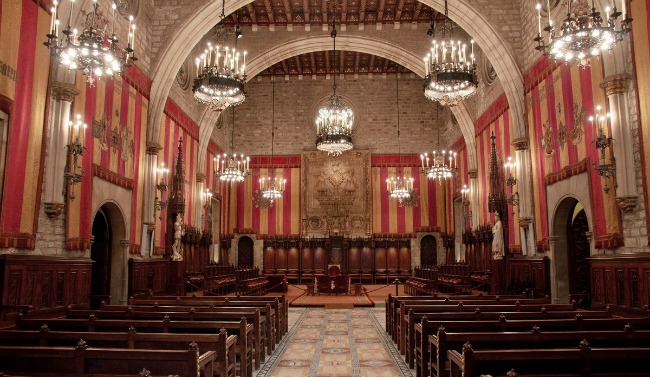
Catalonia's location as a terra de pas or passageway between the Iberian peninsula and the rest of Europe has definitely marked its history as has its position on the Mediterranean. A natural meeting point for different cultures, the territories that Catalonia came to occupy were also of strategic importance to invaders who came from both north and south and also from the sea.
Furthermore, as the land is poor in natural resources, such as precious metals or wheat, the inhabitants had no choice but to go abroad and trade if only in order to survive. Due to Catalonia's reliance on foreign trade, a merchant class developed very early on to rival the oligarchy of the nobles.
Similarly, early trade guilds were set up to regulate local commerce and administer taxes. Consequently, a prosperous and powerful middle class grew up and towns tended to be governed by committees including representatives of the nobility, the church and the merchants and guilds.
As I have already mentioned, the Catalan counties remained vassals of the Franks for longer than other territories in the north of the Iberian peninsula. The House of Barcelona gradually grew to dominate the Marca Hispanica until the title of Count of Barcelona became hereditary under Guifré el Pilós in 897 and declared independence from the Franks under Borrell II in 988. However, the Count of Barcelona was still primus inter pares, first amongst equals, and could only maintain ascendancy over the other counts by consensus.
This contrasts sharply with the political development of landlocked Castile, which was centred on military conquest from and defence against the Moors for more than 250 longer than the kingdoms of the Crown of Aragon. The conquest of Valencia was completed by Jaume I in 1238 whilst the Catholic Kings didn't complete the conquest of Granada until 1492.
Inevitably, a military society would develop along different lines to a society based on trade and commerce. The nobility were military commanders normally subject to direct orders from the king and when a territory was conquered its government was ceded to the noble who conquered it. The land-owning nobles owed allegiance to the king and this relationship favoured absolute monarchy.
As territory was acquired quickly by military means, it was allotted as rewards to nobility, mercenaries and military to exploit in large estates known as latifundia. The gifts finished the traditional small private ownership of land, eliminating a social class that had also been typical of the Al-Andalus period. This didn't happen in Catalonia where peasants were smallholders jealous of their land rights and strongly motivated to get the best out of their plot.
The nobles of Southern Castile and Andalusia were often absentee landowners more interested in the life and intrigues in the royal court than making their large estates more efficient. The population in Southern Spain were not smallholders but an underclass of jornaleros, landless peasants who were hired by the latifundists as day workers for specific seasonal campaigns. The Castilian peasant class lived for the most part in abject poverty and the absence of a dominant class of merchants and tradesmen meant that early democratic structures did not develop in the same way as they did in Catalonia.
A corollary of this was that the Castilian nobility tended to have a distaste for work and commerce considering it below them. A Castilian noble became wealthy as a result of land acquisition not work. The long-term effect of this was a mistrust of Jews, which resulted in their expulsion from Spain in 1492, and the consequent economic and financial problems of the 16th century. Symptomatic of this is the belief that Catalans are mean and avaricious simply because the region remains the industrial and commercial powerhouse of Spain.
These cultural, economic and territorial differences between Castile and a Crown of Aragon have led to two political visions for Spain. Unfortunately, a centralised government ruled by an absolute monarch or for large periods of the 20th century, a dictator, with heavy influence of both the military and the church has generally held sway.
Catalans are very proud of their democratic traditions and their defence has been a major motivation throughout their history. In fact, La Diada, the Catalan National Day celebrated every year on September 11th commemorates the abolition of the Catalan political institutions and charters in 1714 and serves as a reminder that Catalonia wants its traditional democratic rights returned.
****************************************
This excerpt is taken from the Chapter 6 of my forthcoming book 'Catalonia Is Not Spain: A Historical Perspective'
You can find out more on My Blog
Or help me get the book published by contributing to my Crowdfunding Project on Verkami